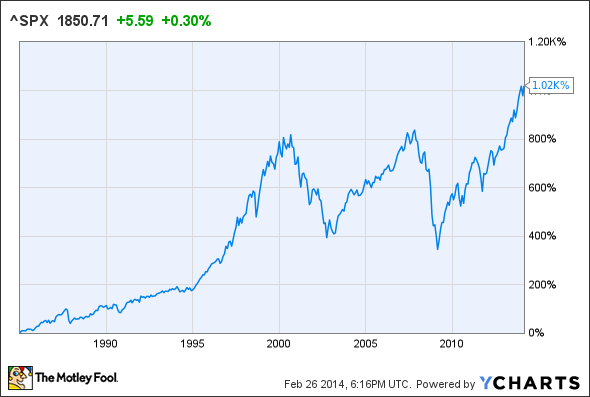Earlier this month, a former Harvard professor announced to the world that he was pulling $1 million from Bank of America for fear of a run on the bank and a total collapse of the global finance system. My personal opinion is that a zombie apocalypse is about as likely as the kind of total world economic collapse this professor fears.

Photo credit: Gianluca Ramalho Misiti
1. In the stock market?
Warren Buffett recommends that most people should invest their money in equities, with a diversified, long-term portfolio. For most investors, this means a low-cost index fund of the S&P 500, like the Vanguard 500 Index Fund.
An investment in the broad stock market represents partial ownership in a huge cross section of the largest, most stable, and strongest companies in the U.S. The S&P has proven that, over the very long term, this approach can yield substantial gains.
The risk in the stock market is the risk of any equity investment. In the event that a specific company goes bankrupt or otherwise fails, common shareholders get paid last.
With that in mind, if you're preparing for a zombie invasion, the stock market is not the best place to keep your money. However, the market is a great place to invest in any other situation short of total annihilation.
2. In bonds?
The simplest way to think about bonds is to consider yourself as the bank, lending your money to the corporation for a certain interest rate. You are not buying ownership in the company; you're giving your cash to the company for a fixed period of time for a fixed return.
This distinction creates advantages and disadvantages. On the positive side, if the company goes bankrupt, bond owners are paid back before equity owners. If a company goes belly-up, the bondholders are in a better position to minimize losses. Government bonds are particularly safe, as they're backed by the full faith and credit of the U.S.

Photo credit: tatu43
But let's be honest: If zombies are running amok, the bondholder advantage in bankruptcy court is worthless. Bonds, unfortunately, are not zombie proof.
3. In the bank?
Another option is to leave your cash in a checking or savings account at a bank.
In today's low-interest-rate environment, bank accounts offer rates lower than even the inflation rate. This means that your money is losing value every single day that it sits in these accounts.

Photo credit: Gianluca Ramalho Misiti
But from a safety perspective, the bank is about as safe as you can get. By structuring your deposits into multiple accounts, you can effectively have the government insure your entire fortune, no matter how large or small, thanks to the FDIC.
And let's be honest: With zombies roaming the streets scouring for brains, its highly unlikely they'll show up at the bank branch and fill out a withdrawal slip.
For regional zombie outbreaks, the bank makes a lot of sense. But if the infection spreads worldwide and collapses the financial system, well, in that case, all bets are off.
5. Under your mattress?
You can pull your money out of the financial system entirely and stuff it under your mattress, or bury it in the backyard. The advantage here is that you can hold your cash with your hands, defending it from the marauders all on your own.
Of course, this cash won't be earning any interest, so every day, inflation will eat away at its value until its worthless. And if someone is able to break into your home and take your money, it will be gone forever with basically no recourse- -- living dead or otherwise.
Oh, and if that zombie invasion never materializes, well, then keeping your money under the mattress is among the worst, if not the worst, place you could possibly put it.
6. Gold?
Gold has been a store of value for as long as goods have been traded. From electronics to manufacturing, gold has intrinsic value in modern society beyond its brilliant yellow finish. But the real value in gold exists because the world sees gold as an excellent hedge on inflation. People want gold, a finite resource, which drives its value far beyond its intrinsic value.
And in a zombie apocalypse, I think gold would do quite well. Mankind has been addicted to the allure of gold going back all the way to the ancient Egyptians, and I don't see that truth changing just because there are roaming packs of brain-hungry zombies on the streets. If society collapses, those who survive will likely turn to gold as the de facto currency of post-apocalyptic trade.
7. Forget saving your money... save yourself!!
Suffice it to say, if there is a zombie virus outbreak, that currency in your mattress probably won't help you much. Bartering with food, water, weapons, and much more basic survival gear will almost certainly take you a lot farther than a stack of $20 bills.
In the worst case, total-annihilation scenario, having a depot of guns, dry foods, water, farming or hunting supplies, and other basic gear will go a long way. Beyond just surviving, these items will be worth far more in barter than any piece of paper -- green or otherwise.
In the worst-case, zombie scenario...
In the event of the zombie apocalypse, your money is probably best kept in farming, hunting, and survival supplies. But let's face it... this is the real world, and we're not going to have a zombie apocalypse. So it makes a lot more sense to have your money stashed in a mix of stocks and bonds that matches your age and risk tolerance.







